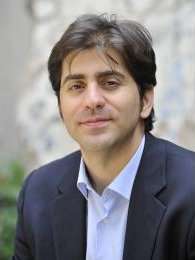Afshin Molavi

Afshin Molavi is an Iranian-American author and expert on global geo-political risk and geo-economics, particularly the Middle East and Asia.[1] He is a senior fellow at the New America Foundation, where he is co-director of the World Economy Roundtable, an ambitious exercise to re-map the global economy in the wake of The Great Recession.[2] In the year 2005, he was selected by the World Economic Forum in Davos as a Young Global Leader, by a committee of 28 international media leaders chaired by Queen Rania of Jordan.[3]
Molavi holds a master's degree in Middle East history and international economics from the Johns Hopkins University Paul H. Nitze School of Advanced International Studies, where he also studied Arabic. He has traveled widely across the Middle East and Asia as a journalist and geo-political risk analyst.
A former Dubai-based correspondent for the Reuters news agency, Tehran-based correspondent for The Washington Post, Riyadh-based business and economics writer for the Arab News, and Washington-based contributor to the Financial Times, Mr. Molavi has written widely on the Middle East, US regional policy, geo-economic trends in the Middle East and Asia, and globalization for a wide range of international publications.
His articles and op-eds have appeared in The New York Times, Foreign Affairs, National Geographic, BusinessWeek, The New Republic, Foreign Policy, Institutional Investor, the Journal of Commerce, and The Wilson Quarterly, among other publications. He wrote the National Geographic cover story on Dubai, entitled “Sudden City.”[4]
Molavi writes regularly for the Abu Dhabi-based newspaper, The National."[5]
He comments regularly on Iran and U.S. policy toward the Middle East on CNN, the BBC, National Public Radio, and other international broadcast outlets. He is also senior Middle East Advisor at Oxford Analytica, a global macro analysis and advisory firm.
Previously, Molavi worked at International Finance Corporation, the private-sector development arm of the World Bank, where he engaged in civil society outreach for the Middle East/North Africa and Southern Europe and Central Asia.
As a fellow at the New America Foundation, Mr. Molavi studies the geo-politics and geo-economics of the Middle East and Asia, as well as the links between economic development and democratization. He is currently studying the economic implications of "the Arab Spring." He is also examining the "New Silk Road" — the growing trade, cultural, diplomatic, and business ties between the Middle East and Asia. Mr. Molavi is also interested in issues related to global economic development, globalization and culture, and the economics of immigration.[6]
He has described the “The New Silk Road” at a conference at the Woodrow Wilson International Center for Scholars on China and the Persian Gulf region,[7] at a World Bank Seminar entitled the East-East Corridor,[8] in an article in the Washington Post entitled “The New Silk Road”,[9] and in the pages of The National, where he wrote about “the meeting of West Asia and East Asia.”[10]
Molavi's analyses of the Iranian presidential election, 2009 in which he believes massive fraud took place, were frequently quoted in the media. He praises the Iranian Constitution of 1906 as progressive and calls for American civil society support for Iranians struggling for freedom.
For example, he has written:
"We need more Americans -- African Americans, Asian Americans, conservative Americans, liberal Americans, red-state Americans, blue-state Americans. If there is one issue that politically polarized America ought to be able to rally around, it is the gallant struggle of Iranians. ... As the regime in Tehran tightens its grip, I hope to see more support from ordinary Americans, and from civil society around the globe, bearing witness, demonstrating solidarity and displaying the common humanity, decency and fairness that bind us all."
Molavi frequently supports Iranian-American civic outreach and youth programs. He has publicly supported the Public Affairs Alliance of Iranian Americans (PAAIA). He was recently a keynote speaker at a PAAIA event for the “next generation of leaders.”
Books
Molavi is the critically acclaimed author of Persian Pilgrimages: Journeys Across Iran (Norton 2002), which was published in paperback under the title, The Soul of Iran (Norton, 2005). The book was dubbed by Foreign Affairs "a brilliant tableau of today's Iran”[11] and made the list of Fareed Zakaria’s CNN GPS recommended books to read on foreign policy.[12] It was also described by former New York Times journalist and Columbia University Professor Bill Berkeley as “a skillfully told and marvelously reported political travelogue.”
Berkeley wrote in his review:
The best of this genre, to my mind, is Afshin Molavi's Persian Pilgrimages, a skillfully reported and marvelously told political travelogue first published in 2002 and reissued last year in paperback under a new title, The Soul of Iran. Molavi, who reported from Iran for the Washington Post, weaves his own travels into an engaging and highly informative tour of Iranian history, politics, and culture. The result is a multilayered portrait that leaves us no less wary of the ruling mullahs but vastly more sympathetic toward the Iranian people.
Molavi can be followed on Twitter @AfshinMolavi.
References
- ↑ http://www.wachouston.org/assnfe/ev.asp?ID=77&
- ↑ http://newamerica.net/user/117
- ↑ https://members.weforum.org/pdf/YGL/list05.pdf
- ↑ http://ngm.nationalgeographic.com/2007/01/dubai/molavi-text
- ↑ http://www.thenational.ae/authors/afshin-molavi
- ↑ http://newamerica.net/user/117
- ↑ http://www.wilsoncenter.org/sites/default/files/ASIA%20Program_China%20and%20the%20PG.pdf
- ↑ http://info.worldbank.org/etools/Bspan/PresentationView.asp?PID=2313&EID=1030
- ↑ http://www.washingtonpost.com/wp-dyn/content/article/2007/04/08/AR2007040800923.html
- ↑ http://www.thenational.ae/thenationalconversation/comment/middle-east-is-pulled-towards-asia-by-economics-and-affinity
- ↑ http://www.foreignaffairs.com/articles/58582/l-carl-brown/persian-pilgrimages-journeys-across-iran
- ↑ "Archived copy". Archived from the original on 2011-10-24. Retrieved 2011-10-17.